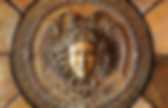

The Labyrinth of Crete, the myth of the Minotaur. Zeus, in the form of a bull, brought Europe from the Phoenician seashore to Gortys in Crete where he made love with her under a plane tree (or on the plane tree after assuming the form of another sacred animal, the eagle), since then the plane tree was blessed to never lose its leaves (evergreen).
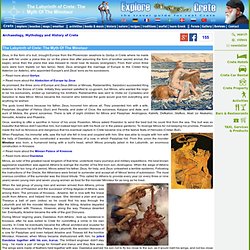
From their union three sons were born triplets (or two twins). Next, Zeus arranged the marriage of Europe to the Cretan King Asterion (or Asterio), who appointed Europe's and Zeus' sons as his successors. -> Read more about Gortys -> Read more about the Abduction of Europe by Zeus. Odyssey. Greek text of the Odyssey's opening passage The Odyssey (Greek: Ὀδύσσεια, Odýsseia) is one of two major ancient Greek epic poems attributed to Homer.
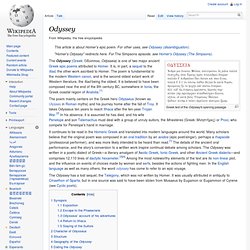
Iliad. The Iliad (sometimes referred to as the Song of Ilion or Song of Ilium) is an ancient Greek epic poem in dactylic hexameter, traditionally attributed to Homer.
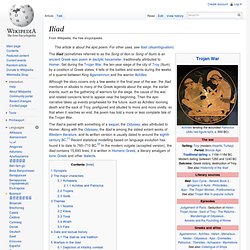
Set during the Trojan War, the ten-year siege of the city of Troy (Ilium) by a coalition of Greek states, it tells of the battles and events during the weeks of a quarrel between King Agamemnon and the warrior Achilles. Although the story covers only a few weeks in the final year of the war, the Iliad mentions or alludes to many of the Greek legends about the siege; the earlier events, such as the gathering of warriors for the siege, the cause of the war, and related concerns tend to appear near the beginning.
Greek mythology. Greek mythology is explicitly embodied in a large collection of narratives, and implicitly in Greek representational arts, such as vase-paintings and votive gifts.
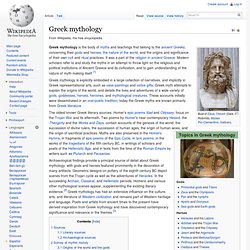
Greek myth attempts to explain the origins of the world, and details the lives and adventures of a wide variety of gods, goddesses, heroes, heroines, and mythological creatures. These accounts initially were disseminated in an oral-poetic tradition; today the Greek myths are known primarily from Greek literature. Archaeological findings provide a principal source of detail about Greek mythology, with gods and heroes featured prominently in the decoration of many artifacts. Geometric designs on pottery of the eighth century BC depict scenes from the Trojan cycle as well as the adventures of Heracles. Sources Literary sources The poetry of the Hellenistic and Roman ages was primarily composed as a literary rather than cultic exercise. Archaeological sources Survey of mythic history. Religion in ancient Greece.
Many Greek people recognized the major (Olympian) gods and goddesses: Zeus, Poseidon, Hades, Apollo, Artemis, Aphrodite, Ares, Dionysus, Hephaestus, Athena, Hermes, Demeter, Hestia, and Hera though philosophies such as Stoicism and some forms of Platonism used language that seems to posit a transcendent single deity.
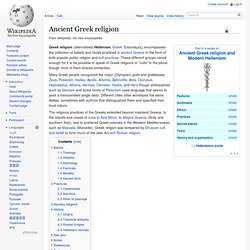
Different cities often worshiped the same deities, sometimes with epithets that distinguished them and specified their local nature. The religious practices of the Greeks extended beyond mainland Greece, to the islands and coasts of Ionia in Asia Minor, to Magna Graecia (Sicily and southern Italy), and to scattered Greek colonies in the Western Mediterranean, such as Massalia (Marseille). Greek religion was tempered by Etruscan cult and belief to form much of the later Ancient Roman religion. Beliefs.
Chthonic. Some dictionaries, such as the OED, state that the first two letters should be pronounced (as /k/), /ˈkθɒnɪk/, while others, such as the AHD, record these letters as silent, /ˈθɒnɪk/.
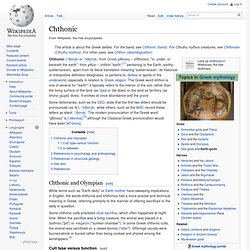
The modern pronunciation of the Greek word "χθόνιος" is [ˈxθonios],[2] although the Classical Greek pronunciation would have been [ktʰónios]. Chthonic and Olympian[edit] While terms such as "Earth deity" or Earth mother have sweeping implications in English, the words khthonie and khthonios had a more precise and technical meaning in Greek, referring primarily to the manner of offering sacrifices to the deity in question. Some chthonic cults practised ritual sacrifice, which often happened at night time. When the sacrifice was a living creature, the animal was placed in a bothros ("pit") or megaron ("sunken chamber"). Cult type versus function[edit] Also, Demeter was worshipped alongside Persephone with identical rites, and yet occasionally was classified as an "Olympian" in late poetry and myth.
Elysium. Elysium or the Elysian Fields (Ancient Greek: Ἠλύσιον πεδίον, Ēlýsion pedíon) is a conception of the afterlife that developed over time and was maintained by certain Greek religious and philosophical sects and cults.
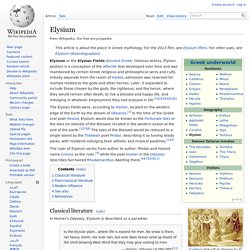
Initially separate from the realm of Hades, admission was reserved for mortals related to the gods and other heroes. Later, it expanded to include those chosen by the gods, the righteous, and the heroic, where they would remain after death, to live a blessed and happy life, and indulging in whatever employment they had enjoyed in life.[1][2][3][4][5][6] The ruler of Elysium varies from author to author: Pindar and Hesiod name Cronus as the ruler,[9] while the poet Homer in the Odyssey describes fair-haired Rhadamanthus dwelling there.[6][7][10][11] Classical literature[edit] In Homer’s Odyssey, Elysium is described as a paradise: to the Elysian plain…where life is easiest for men. Pindar's Odes describes the reward waiting for those living a righteous life: See also[edit]
Aether (mythology) In Greek mythology, Aether or Aither (Æthere, Ancient Greek: Αἰθήρ, pronounced [aitʰɛ̌ːr]), also known as Akmon or Acmon in Latin (possibly from the same route as "Acme") is one of the primordial deities, the first-born elementals.
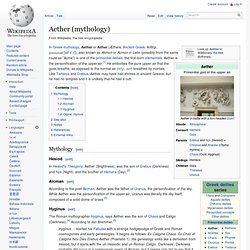
Aether is the personification of the upper air.[1] He embodies the pure upper air that the gods breathe, as opposed to the normal air (ἀήρ, aer) breathed by mortals. Like Tartarus and Erebus, Aether may have had shrines in ancient Greece, but he had no temples and it is unlikely that he had a cult. Hyginus ... started his Fabulae with a strange hodgepodge of Greek and Roman cosmogonies and early genealogies. It begins as follows: Ex Caligine Chaos. Ex Chao et Caligine Nox Dies Erebus Aether (Praefatio 1). Pan (god) Family tree of the Greek gods. Key: The essential Olympians' names are given in bold font.
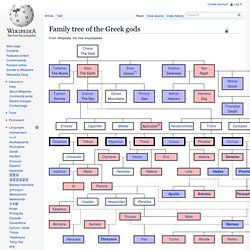
See also List of Greek mythological figures Notes External links Media related to Family trees of Greek mythology at Wikimedia Commons. Greek Gods Family Tree. Ludios.org.
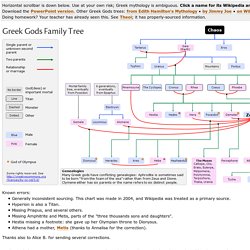
Uranus (mythology) THEOI GREEK MYTHOLOGY, Exploring Mythology & the Greek Gods in C.